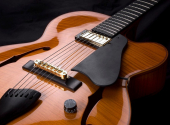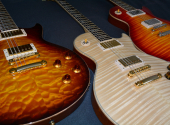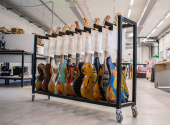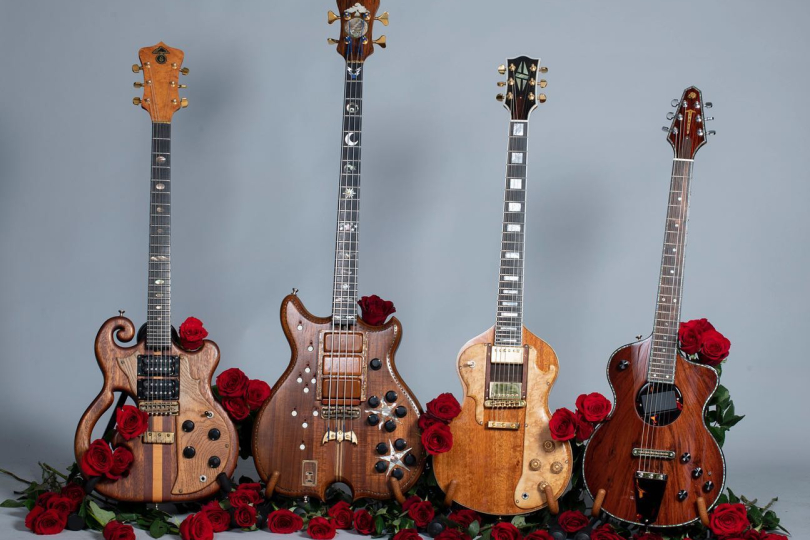
Legendary and Mythical Guitars #8: Rick Turner Guitars
"Go Your Own Way". That's the title of the fifth song from the famous Fleetwood Mac album Rumours. You could say that "Go Your Own Way" became the life motto of Rick Turner, a guitar maker who did things a bit differently than others. And it was Fleetwood Mac who introduced him to the world. Or at least to me.
First meeting
In the 1980s in Czechoslovakia, those who had a VHS tape player were, as the saying of the time went, "very popular with the work team". And if they also had a collection of recordings of live concerts by so-called "Western performers", they were considered to be something like a prophet among their fellow musicians. Once I saw footage of a Fleetwood Mac live concert at one of these friends' houses. After the release of Rumours, the originally very bluesy band became a pop-rock bestseller.
Naturally, the video was dominated by the charming Stevie Nicks. She was the one we were all platonically in love with back then, or rather, she shared the spotlight with Sheila E., Kate Bush and Nancy Wilson. But I was perhaps even more taken with guitarist Lindsey Buckingham. Not only with his brilliant playing and singing but also with his strange guitar, which was unlike anything I had seen before. It was a kind of unique hybrid with lots of knobs and a pickup in the soundhole. Of course, back in the days without the internet, we had no idea what kind of instrument it was.
Forty years full of changes had passed, and I was just strolling down the aisle of the exhibition pavilion in Anaheim, California when I spotted the familiar guitar shape. What is it and what the hell does it remind me of, I wondered. Intuitively, I headed to the booth and saw the Rick Turner Guitars logo. And then it dawned on me. It was the guitar Lindsey Buckingham used to rock out with! This happened at a time when we no longer lacked information, but rather slowly started to feel lost in it. So it didn't take much to get the whole story.
No need for too many turns
Rick Turner was born in 1943 in Massachusetts as Warwick Lancelot Armstrong Turner III. From a young age, he helped in a shop that repaired musical instruments and got his first guitar at the age of eleven. He was involved with music from a young age and as a reckless young man, he got fully caught up in the psychedelic wave, which he rode along with various bands of this genre. So it's no wonder he moved to California, where he met the Grateful Dead.
That's when he got the idea to try out what a low-impedance pickup sounded like. While the machines at the Gibson or Fender factories wound 8,000 turns of wire into their pickups, Rick stopped somewhere around a hundred on his hand-wound pickup. His buddy at the time, Ron Wickersham, an enthusiast for electronics of all kinds, figured they'd compensate for the pickup's weaker output with what guitarists and bassists call "active electronics," a built-in preamp. He was thrilled with the frequency range of the signal that Rick's pickups produced.
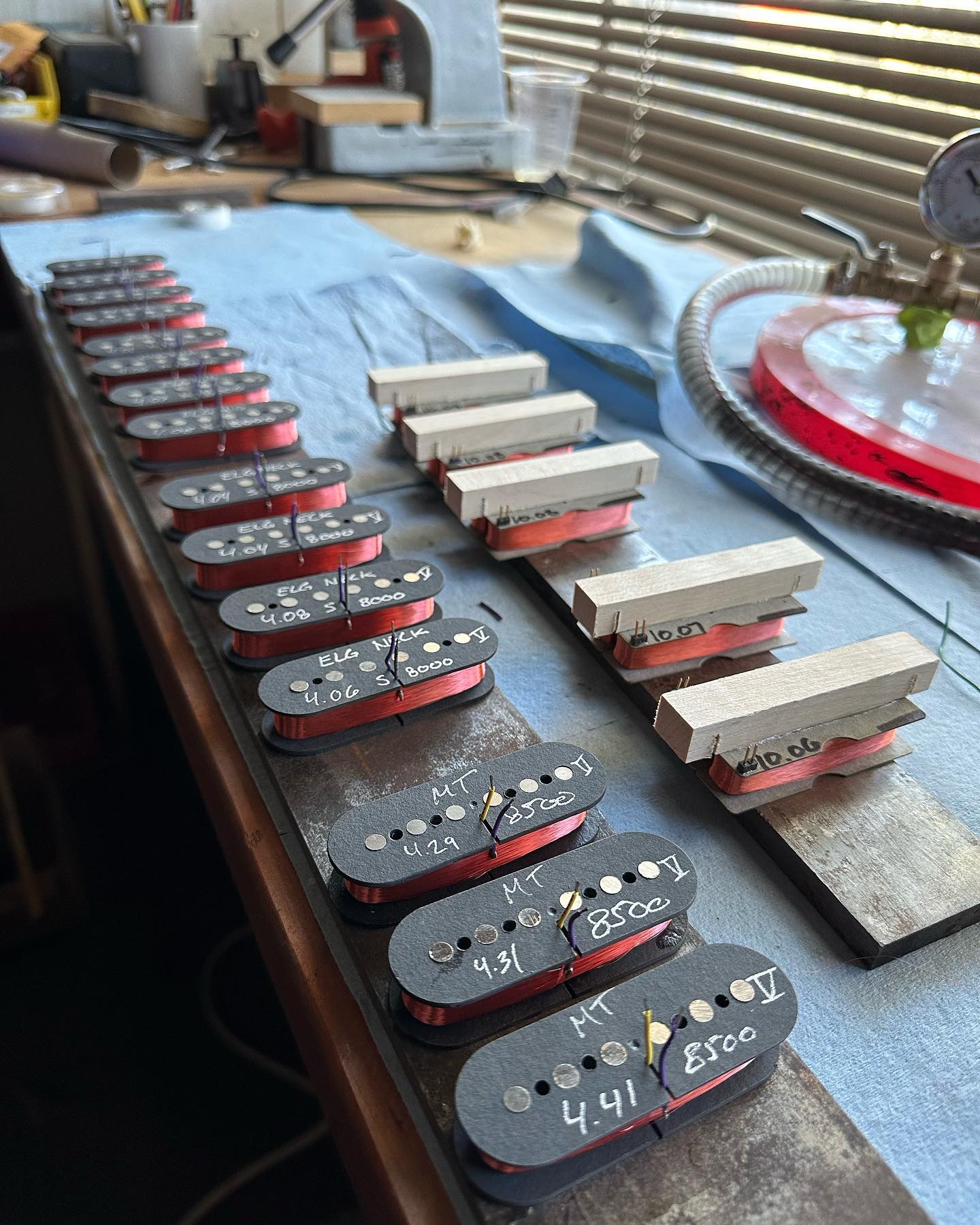
And that was the beginning of the legendary Alembic company. Other partners in the company were Owsley Stanley and Bob Matthews, the Grateful Dead's sound engineers. The first instrument they made in 1972 was a bass for Jack Casady, bassist for Jefferson Airplane. Later, other notable bass endorsers such as Stanley Clarke and John Entwistle came along. As for guitars, the Eagle model made famous by Jerry Garcia became legendary.
Turner left Alembic in 1978 and began work on his own guitar, called Model 1. As with the pickups, he didn't follow the established process. The guitar had an arched top, a laminated neck, and the shape was something between an OOM-type acoustic guitar and a "squashed Gibson". Once completed, it immediately fell into Lindsey Buckingham's hands. It was this model that I spotted on the video and rediscovered many years later.
After a short career in Gibson's development department, Rick finally decided to work for himself. Since then, Rick Turner Guitars has existed as a full-fledged business entity, producing very unusual and very carefully crafted instruments in small quantities, often used by top musicians.
Sadly, two summers ago Rick Turner passed away. But the company that bears his name carries on, true to his legacy.
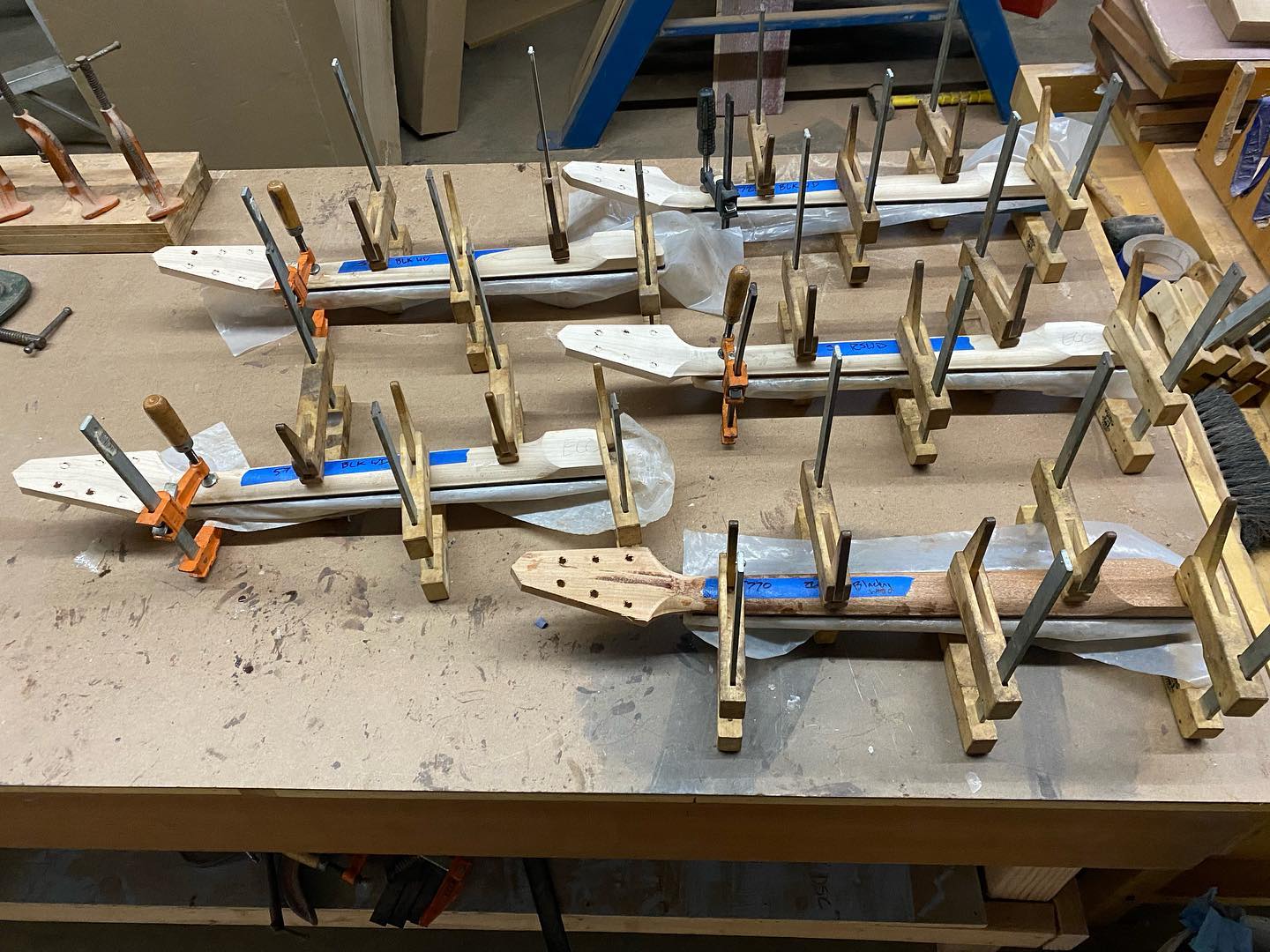
What is it about
How do Rick's guitars differ from other instruments? Pretty much in everything, actually. You won't mistake a Rick Turner guitar for another, no matter which model, whether it's the shape of the guitar, the profile or the electronics.
The Model 1 that made the luthier famous is, in the words of its creator, based on a Stauffer guitar made in Vienna in the 19th century. The scale is 24 3/4, the body is made of mahogany, nowadays possibly cedar on request, and also with a thin top layer of maple or other woods. It has a set-in neck, glued from laminated maple or mahogany. Thanks to its quasi-resonant soundhole, where the rotary humbucker is located, the guitar appears to be hollow. But this is only an illusion. It's a pure solid-body instrument. The hardware usually comes from Gotoh (or Planet Waves) and there are twenty-four frets.
Electronics is based on a custom-designed humbucker which can be supplemented with a piezo pickup (usually L.R.Baggs) in the headstock and an active electronics system called D-Tar Eclipse. This is an eighteen-volt preamp developed with Seymour Duncan. The purpose of this rather complex circuit is the ability to combine the sound of a magnetic pickup with a piezo pickup according to your own preferences. The preamplifier includes a parametric equaliser. All this is complemented by the possibility of disconnecting the humbucker coils and using it as a passive pickup. Thus, the player has a wide choice of tones from a brilliant, almost acoustic sound to a "muscular" two-coil sound.
Product range
The Model 1 is the core item of the range and the brand's trademark. Despite being available today in several material variants and pickup configurations, it is the manufacturer's most standard model.
It has been joined by another range called Renaissance. These are semi-hollowbody hybrid guitars designed to accurately reproduce the sound of an acoustic instrument with the ergonomics of an electric guitar and the absence of feedback. You can choose between six-string steel or nylon-string instruments or twelve-string guitars. There is also the Deuce model, which adds a single magnetic pickup which can be combined with a piezo. The Renaissance series is available with a mahogany back and sides, while the top can also be mahogany, cedar or redwood. The manufacturer uses their active electronics system for the built-in piezo pickup.
A new element in the Rick Turner Guitars range is a series named Electroline. In this case, the design does resemble an electric guitar, although, true to tradition, the styling is again somewhat bizarre. The guitar looks like a small strat, which I personally find a bit "goofy". However, the instrument is made with the precision characteristic of the manufacturer. The trio of single coil pickups is complemented by a Scott Walker active boost which adds signal strength and frequency depth.
RTG also has two standard bass models in its repertoire. One is derived from Model 1 and the other, quasi-acoustic, is based on the Renaissance model.
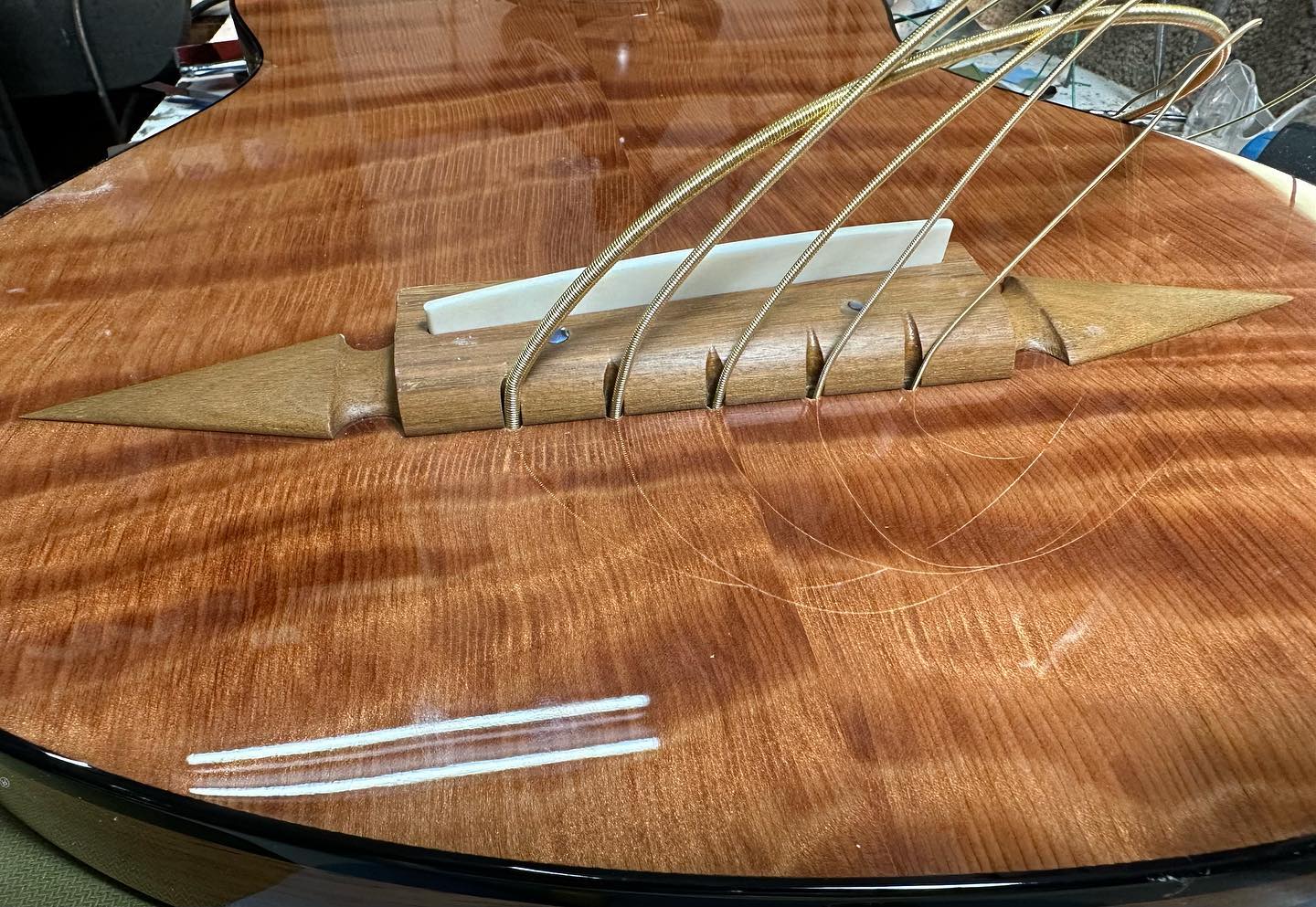
Where and for how much
The official dealer list suggests that this is a true rarity, not a mass-market affair. Even on the domestic, American market, where Rick Turner is now a legend among guitar makers, the brand's representation is not at all "widespread" and limited mainly to renowned dealers, known for their expertise, but also for their large stock and wide range of unique instruments. So, for example, Heartbreaker Guitars, Rudy's Music (Rudy's last name is Pensa, so you can guess...) and similar high-profile names.
Outside the United States, there are official dealerships in only four other states. Strangely enough, a market as strong as Germany, for example, has no official dealership. You can buy an RT guitar in the Netherlands, for example at my favourite shop (the size of a medium castle) called The Fellowship of Acoustics in Dedemswaart. Not only is it one of the nicest guitar shops I've ever seen, but it also stands out for its expertise. At the moment, they only have one piece, a Renaissance Steel String for 3,000 euros.
At Heartbreaker Guitars in Las Vegas, they have over twenty models available at prices ranging from about 4 300 to 6 400 dollars, and only two models are around 8 500 dollars.
Who plays Rick Turner guitars
As we wrote at the beginning, the seminal artist in the history of Rick Turner Guitars is Lindsey Buckingham. Apart from him, John Mayer made the brand famous by using their guitar on some of his recordings. Other brand ambassadors include Pat Simmons (Doobie Brothers) and Robbie Krieger, a former member of the legendary Doors.
To conclude
You don't buy a Rick Turner guitar because it screams at you from every guitar magazine ad or because it's on sale here or there. It's a rare commodity that you have to be interested in and you have to search for. Unique design that has no other relatives in the world, active electronics resulting from manufacturer's own research and development, specific shapes. Everything takes some getting used to, as the eye of a musician, especially of an old-school one, is very conservative. But when you see Lindsey Buckingham rock out on the instrument, you think there must be something to it.
When you pick up this piece of art and see with what care and attention to the smallest detail it has been made, the overall impression can be nothing but enthusiasm and admiration. I speak from my own experience, and that is of course only a personal point of view. However, in the guitar industry, there are certain unwritten standards of what qualifies as a good instrument. All Rick Turner guitars cross this imaginary line by miles heading towards perfection.
If you have found an error or typo in the article, please let us know by e-mail info@insounder.org.


